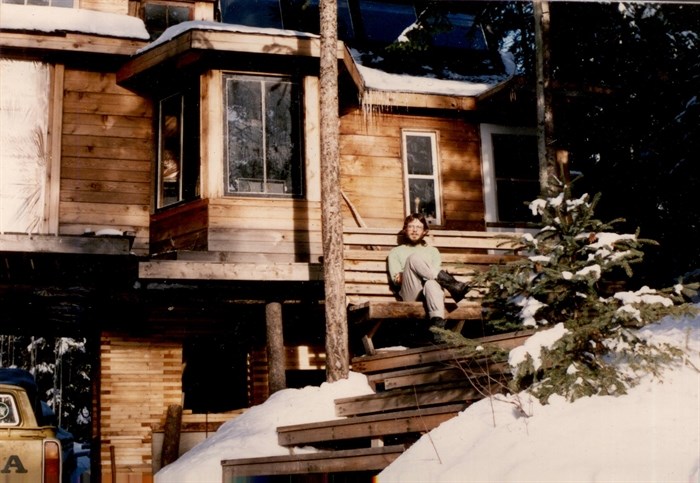
Martin Davis and the cabin he built in Stocks Meadow, 1986.
Image Credit: SUBMITTED/ Martin Davis
June 19, 2020 - 7:30 AM
For many, the abandoned hippie commune is simply a curious relic of history hidden in the West Kelowna woods.
For Martin Davis, it was his home for nine years.
When he helped his brother build a house in Stocks Meadow in 1979, Davis found that the small commune appealed to him.
“It just seemed like a really nice lifestyle,” he said. “It was something I was interested in doing.”
At 22 years old, he followed his brother by building his own home in the meadow.
“We wanted to do a back-to-the-land thing, grow our own food, have clean water,” he said.
At that time, Stocks Meadow was owned by a group of shareholders who had given some friends permission to build on their land.
The group formed a land co-op, and collaborated on projects like building the workshop and bath house, or gardening.
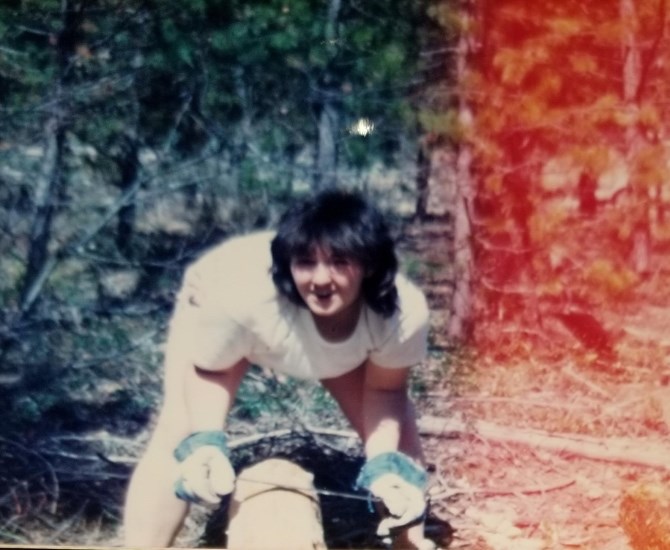
Winbow stripping a log to build a playground, 1986.
Image Credit: SUBMITTED / Lara Winbow
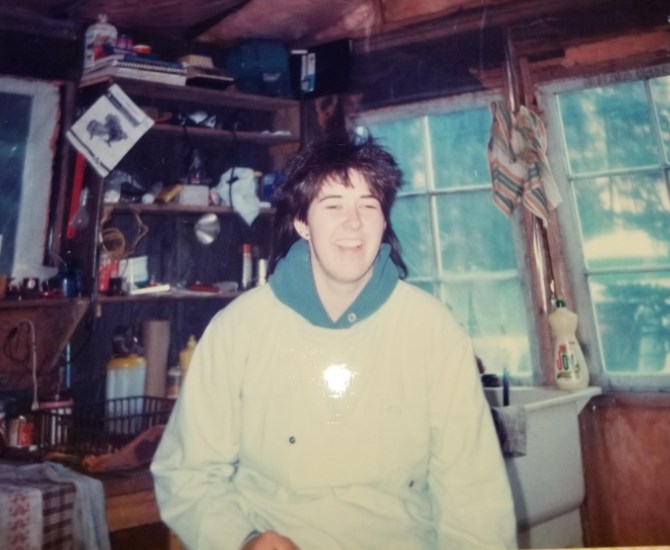
Winbow inside one of the cabins at Stocks Meadow, 1986.
Image Credit: SUBMITTED / Lara Winbow
In 1986, Lara Winbow spent a weekend at the meadow with a group of youth volunteering through a government program.
"We chopped down some trees and took all the bark off and built a playground for the kids," Winbow said. "It was a really cool experience."
The residents of Stocks Meadow varied in age, from young children to adults in their twenties to late thirties. At its peak, Davis estimates there were 30 people living in the co-op.
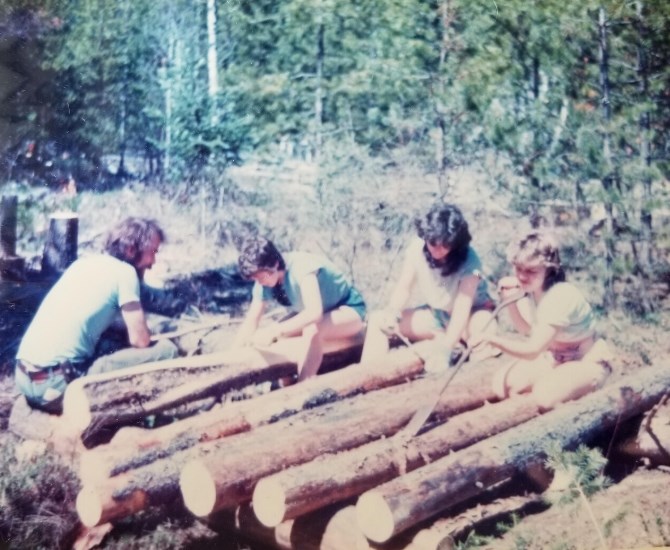
Volunteers stripping logs to build a playground at Stocks Meadow, 1986.
Image Credit: SUBMITTED / Lara Winbow
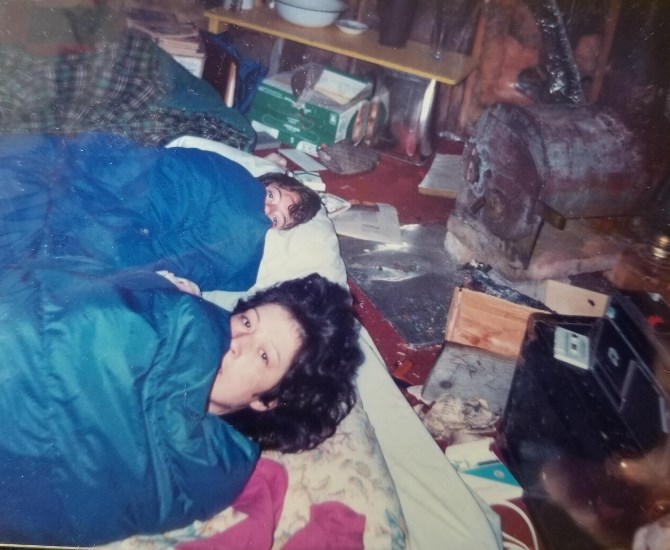
The volunteers staying overnight in one of the cabins at Stocks Meadow, 1986.
Image Credit: SUBMITTED / Lara Winbow
Over time, it became clear to him that some people in the group had some conflicting ideas.
“Some people believed that we needed to go back to the old ways, to give up vehicles and just have horses,” he said. “Then others like myself and my brother were sort of techno-peasants, where we’d take the best of technology to create a comfortable lifestyle in the bush.”
His brother built a satellite dish which they used to get news from around the world. On one memorable occasion, they tuned into the Live Aid concert.
“Here we were out in the bush and yet we felt like we were part of the world as a whole,” he said.
Although the group was close initially, it became divided over time, Davis said.
A man called Yellow Bear had the idea that he was the governing force of the community, he said, which some residents weren’t pleased with.
“And then, being kind of a hippie community, there were a lot of funny things going on between each other in terms of relationships,” he said. “Changing partners and that, and that created some strife too as it often does.”
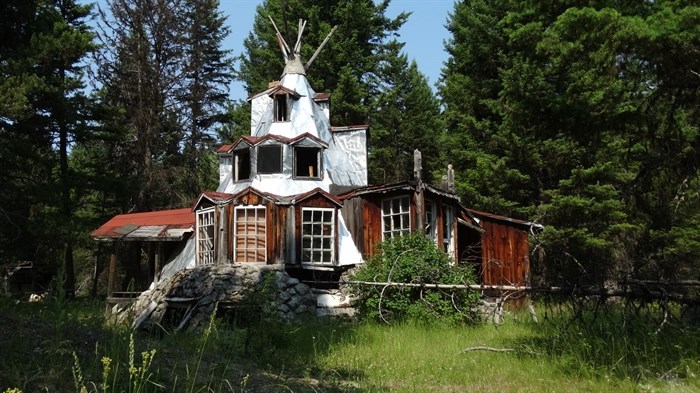
The "teepee house" in Stocks Meadow.
Image Credit: FACEBOOK / Forgotten British Columbia
However, their gatherings and celebrations pulled the community together.
“We’d have big solstice parties, and we put on these pageants that involved performance and music and fireworks,” he said.
“That was sort of what gave us our social cohesion. Over the years, the community began to drift apart. It was an issue getting up and down the mountain to Kelowna, especially in the winter."
By the time Davis returned to visit the commune with his son in 1996, there was only one person living there.
“It was kind of depressing seeing everything with nobody there anymore,” he said. “We had always had this idea that the community would live on and that other people would be interested in taking on that lifestyle. But really it just kind of fell apart after several years.”
However, the community was still occupied until the early 2000s. As a child, Seamus Olfert would spend weeks at a time living in Stocks Meadow with his mother, step-father and uncle.
By that time, there were no children other than Olfert and his sister, and only about three of the cabins were occupied.
“There was one guy who had a whole bunch of cats,” he said. “Then there was the guy in the teepee house.”
Olfert remembers playing in one of the abandoned cabins.
“There was just a whole bunch of really old junk in there,” he said. “I’d build like a makeshift bow and arrow and I would go in there and try and shoot the rats.”
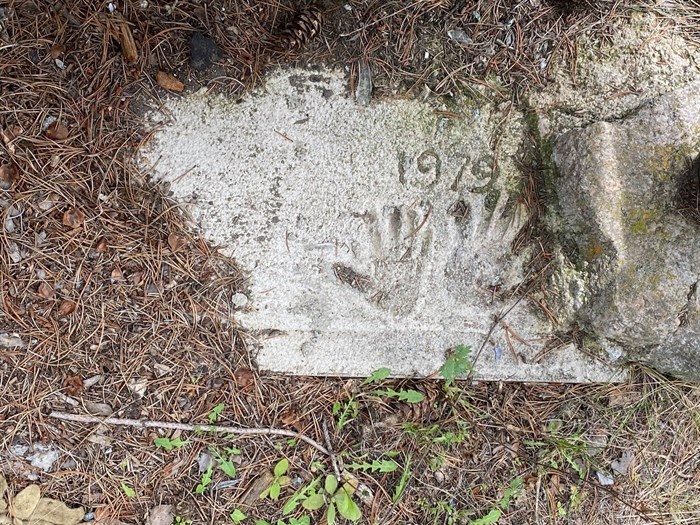
Stocks Meadow, 2020.
Image Credit: SUMBITTED
Living remotely in the woods at a young age taught Olfert several skills he appreciates as an adult.
"I definitely feel like when I’m out in the woods, I’m completely comfortable out there," he said.
He learned to catch and gut fish, pan for gold and carve soapstone.
Davis also carries the knowledge he gained in Stocks Meadow with him today.
"It certainly taught me a lot of skills, like how to run a chainsaw, how to build a house, how to generate your own power," he said. "It all sort of stayed with me, that idea of creating resilience in a community."
Many of the former residents still connect through a private Facebook group. When asked to share their experiences living in Stocks Meadow, many past residents hesitated. Even now, separated by time and geography, they opened a discussion, aired their concerns and the majority decided — as a group — to keep their memories private.
Davis doesn't really understand their reasoning, he has little but positive things to say about his time there.
"My time at Stocks taught me a wealth of knowledge about not only how to make a go of it in the bush, but also about human interactions in general," he said.
"There were parts that were great, and parts that were very distasteful, but I learned from it all."
To contact a reporter for this story, email Brie Welton or call (250) 819-3723 or email the editor. You can also submit photos, videos or news tips to the newsroom and be entered to win a monthly prize draw.
We welcome your comments and opinions on our stories but play nice. We won't censor or delete comments unless they contain off-topic statements or links, unnecessary vulgarity, false facts, spam or obviously fake profiles. If you have any concerns about what you see in comments, email the editor in the link above.
News from © iNFOnews, 2020